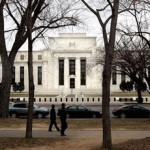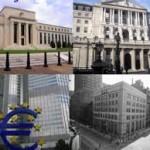BIS warns over ‘Euphoric’ capital markets

The Bank for International Settlements (BIS) has warned that “euphoric” financial markets have become detached from the reality of a lingering post-crisis malaise, as it called for governments to ditch policies that risk stoking unsustainable asset booms.
While the global economy is struggling to escape the shadow of the crisis of 2007-09, capital markets are “extraordinarily buoyant”, the Basel-based bank said, in part because of the ultra-low monetary policy being pursued around the world.
Leading central banks should not fall into the trap of raising rates “too slowly and too late”, the BIS said, calling for policy makers to halt the steady rise in debt burdens around the world and embark on reforms to boost productivity.
In its annual report, the BIS also warned of the risks brewing in emerging markets, setting out early warning indicators of possible banking crises in a number of jurisdictions, including most notably China.
“Particularly for countries in the late stages of financial booms, the trade-off is now between the risk of bringing forward the downward leg of the cycle and that of suffering a bigger bust later on,” it said.
The BIS, the bank for central banks, has been a longstanding sceptic about the benefits of ultra-stimulative monetary and fiscal policies and its latest intervention reflects mounting concern that the rebound in capital markets and real estate is built on fragile foundations.
The report comes days after the Bank of England became the first major central bank to raid its new macroprudential toolkit to stop a credit boom in the housing market from derailing the UK’s economic recovery.
The BoE hopes its restrictions on riskier forms of mortgage lending will tame any property bubble without damaging growth. But the BIS warned that deploying macroprudential tools, which central banks around the world have adopted, was a poor substitute for higher rates.
“These tools have proved very helpful in increasing the resilience of the financial system, but they have been only partially effective in restraining the build-up of financial imbalances,” the BIS said. “Failing to rely on monetary policy can raise even more serious challenges down the road.”
The BIS view on interest rates is at odds with the stance of the International Monetary Fund, which this month called on the European Central Bank to ease monetary policy by embarking on large-scale asset purchases, should the threat of a dangerous bout of falling prices persist.
Christine Lagarde, the IMF’s managing director, has dubbed the risk of a prolonged period of deflation as “the ogre” haunting the global economy, but the BIS said the risk of outright and persistent falling prices was low.
“Good policy is less a question of seeking to pump up growth at all costs than of removing the obstacles that hold it back,” the BIS argued, saying the recent upturn in the global economy was a precious opportunity for reform and that policy needed to become more symmetrical in responding to both booms and busts.
Global markets are currently “under the spell” of central banks and their unprecedented monetary policy settings, it said. The Vix index of US share price volatility, known as the Wall Street fear gauge, has fallen in June to a seven-year low, while measures of foreign exchange and bond market volatility have also plummeted.
The FTSE all-world share index has risen 5 per cent so far in 2014 and is 150 per cent above its March 2009 low. Yields on 10-year US Treasuries, which move inversely with prices, have fallen this year, defying expectations of an end to a 30-year bond market rally.
Source: FT




























